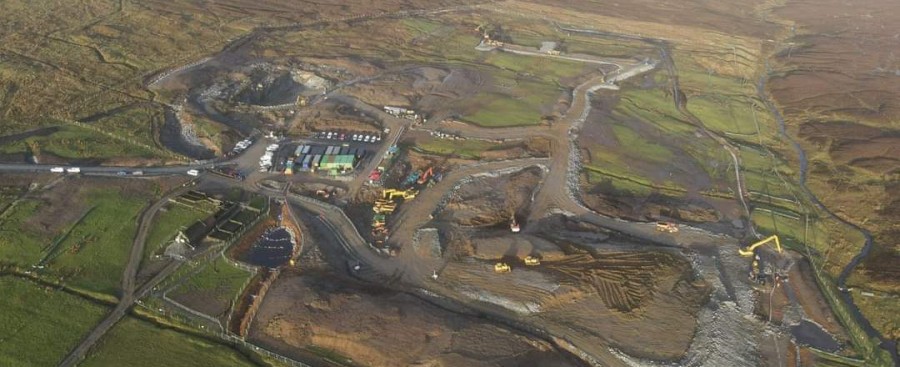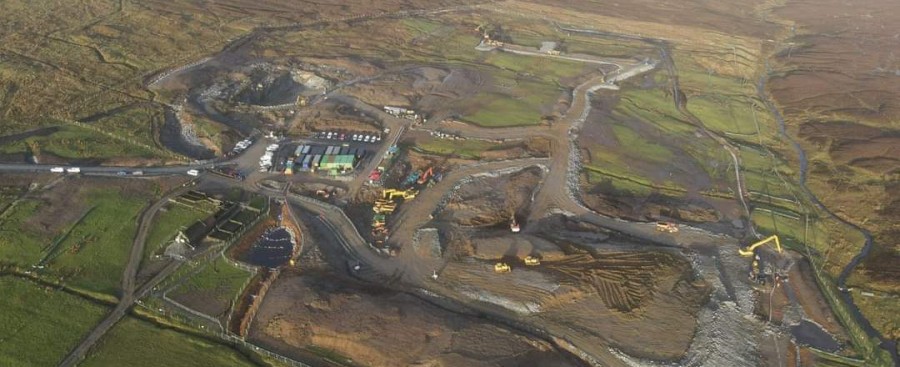BRE has partnered with BAM Nuttall and Attocore to create a secure, stand-alone
5G network that is being used on a UK construction site for the first time.
BAM Nuttall’s Scottish and Southern Electricity Networks (SSEN) Transmission
Shetland project is testing the new technology to boost innovation and
investment, while supporting the connection of Shetland to the GB grid to help
meet Shetland’s future energy needs.
The 5G network is part of a programme to support nine UK 5G trial projects
in early 2021 with £15.2m funding from Department for Digital, Culture, Media
& Sport (DCMS) to test the potential of the technology and demonstrate the
benefits. Other stand-alone 5G networks are also being trialled across a range
of industries.
Up to now 5G has rarely been used by the construction industry. The 5G
network allows BAM to use a mix of digital tools, while a team analyses the
data to improve decision-making and delivery methods.

BAM’s team is deploying numerous 5G supported solutions, including digital
live cameras and drones; mixed-reality and virtual visualisation; artificial
intelligence and Internet of Things sensors to monitor construction processes
and measure progress.
The potential benefits include:
- Safety – using artificial intelligence (AI) to carry out site surveys and
send back live data means less people surveying remote locations and tracking
progress; hard-hats with location sensors to track people’s whereabouts and
alert safety advisors. - Quality job design: more data analytics; operating tech and using augmented
reality and digital models to detect clashes; more collaboration; less time out
on site in bad weather. -
Accurate, live data driving decisions and collaboration – access to live drone
footage and cameras on site; time-lapse photography and footage – visualising
project progress.
With 5G now switched on at this exciting project in Shetland, it will unlock
a huge range of transformative tech from cameras and drones that enable
builders to work more flexibly, to mixed-reality glasses so they can see 3D
building designs live on site.” – Minister for Media, Data and Digital
Infrastructure Julia Lopez
Colin Evison, Head of Innovation at BAM Nuttall said: “5G is unlocking
increased use of digital tools and models as we explore safer, more modern and
efficient ways to work in construction. We’re excited for the next steps as we
trial new solutions which, without the 5G network, wouldn’t be possible.
“We’re looking forward to seeing the results and ultimately sharing the
benefits across wider industry. We’re proud to be working in collaboration with
SSEN Transmission and thank them for supporting this trial as we help deliver
the decarbonisation of Scotland – helping to achieve net-zero carbon, and
increase diversity, by modernising construction.”
Minister for Media, Data and Digital Infrastructure Julia Lopez said: “5G
can revolutionise the way Britain builds, which is why we’re investing £200
million in cutting-edge innovation projects to ensure we unleash its ability to
drive growth across the construction industry.
“With 5G now switched on at this exciting project in Shetland, it will
unlock a huge range of transformative tech from cameras and drones that enable
builders to work more flexibly, to mixed-reality glasses so they can see 3D
building designs live on site.”
The consortium is a partner of the 5pring accelerator programme
and will work with start-ups to trial and improve manufacturing technology,
adapting it for future use in the construction sector.
Located on a remote site in Shetland, BAM Nuttall’s project team is
designing and constructing the civils infrastructure at Kergord on Shetland for
SSEN Transmission’s HVDC convertor station and substation, part of the Shetland
HVDC link. When completed, this major link between Shetland and the Scottish
mainland will feed renewable energy to the electricity grid and connect Shetland
to the GB grid for the first time, supporting its future security of supply.
The project site at Kergord, provides the ideal conditions to measure the
benefits for the construction industry. Challenges typically faced on building
sites are magnified and will stretch the use of 5G technology.
The site area spans 55,176m2 of challenging terrain; weather conditions are
cold, wet and harsh; winter’s daylight hours are short. Clients and management
teams can’t easily visit the site and rely on reports, data, images and
insights to track progress and make decisions, based in offices, 100s of miles
from site.
BAM’s project team is collecting evidence of how the technology can help
improve safety, sustainability and increase collaboration. One of the most exciting
opportunities is how technology impacts the design of jobs in engineering and
construction. It’s hoped that technology, like 5G, and the capability it
brings, will support more flexible working and increase the appeal of careers
in construction to a wider diversity of people.
